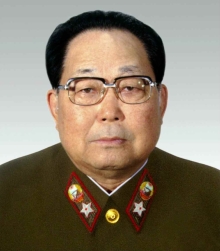Kim Yong-chun facts for kids
Quick facts for kids
Marshal
Kim Yong-chun
|
|
|---|---|
| 김영춘 | |
 |
|
| Minister of People's Armed Forces | |
| In office February 2009 – April 2012 |
|
| Vice Chairman of the National Defense Commission of North Korea | |
| In office 9 April 2009 – 13 April 2014 |
|
| Personal details | |
| Born | 4 March 1936 Pochon County, Ryanggang Province, Japanese Korea |
| Died | 16 August 2018 (aged 82) |
| Political party | Workers' Party of Korea |
| Alma mater | Kim Il-sung Military University Frunze Military Academy |
| Military service | |
| Allegiance | |
| Branch/service | |
| Years of service | 1986–2018 |
| Rank | |
| Korean name | |
| Chosŏn'gŭl | |
| Hancha | |
| Revised Romanization | Gim Yeong-chun |
| McCune–Reischauer | Kim Yŏngch'un |
Kim Yong-chun (born March 4, 1936 – died August 16, 2018) was an important soldier and politician from North Korea. He was a top leader in the North Korean military. He reached the high military rank of Vice Marshal. He also served as the Vice Chairman of the National Defense Commission of North Korea and was the Minister of People's Armed Forces. This role is similar to a Minister of Defence in other countries.
Early Life and Education
Kim Yong-chun was born in 1936 in Yanggang Province, which was then part of Japanese Korea. He went to the Mangyongdae Revolutionary School and later studied at the Kim Il-sung Military University. These schools helped him prepare for a career in the government and the military.
Military and Political Career
Kim Yong-chun began his career in the 1960s. He worked as a secretary for the Workers' Party of Korea in South Pyongyang Province. In 1980, he became a member of the Workers' Party Central Committee.
In 1986, he became a full member of the Central Committee. He also became a director in the military's General Staff Operations Bureau. For a short time in 1988, he faced some difficulties in his career.
Kim Yong-chun returned to important roles in the 1990s. He was promoted to general and became the director of the General Munitions Mobilization Bureau. He also helped reorganize a military group called the North Hamgyong Province's Sixth Army Corps.
In 1995, he was promoted to Vice Marshal. He became the Chief of the KPA General Staff, a very important military position. He held this job until 2007. After that, he was appointed as a vice-chairman of the National Defence Commission.
Kim Yong-chun was known to be close to Kim Jong-il, who was the leader of North Korea at the time. He received more promotions in 2009, becoming the Minister of People's Armed Forces. In 2010, he joined the Politburo and the Central Military Commission, which are powerful groups in the government.
After Kim Jong-il passed away in December 2011, Kim Yong-chun was seen as a very powerful figure in the new leadership. He was ranked fifth among the members of Kim Jong-il's funeral committee.
In April 2012, he was replaced as Minister by Kim Jong-gak. He then became the director of the Workers' Party Civil Defense Department. Even though he was no longer in his main leadership roles, he received the special honorary rank of Marshal of the Korean People's Army in April 2016.
Death
Kim Yong-chun passed away on August 16, 2018, at the age of 82. He died from a heart attack.
Awards and Honors
Kim Yong-chun received many awards and honors throughout his long career. These showed his dedication and service to North Korea. Some of his notable awards included:
- Two gold wristwatches and one pocket watch with the signatures of Kim Il Sung or Kim Jong Il.
- Two silver wristwatches with the signatures of Kim Il Sung or Kim Jong Il.
 Hero of the Republic
Hero of the Republic Order of Kim Il-sung, twice
Order of Kim Il-sung, twice Order of Kim Jong Il
Order of Kim Jong Il Order of the National Flag First Class, eight times
Order of the National Flag First Class, eight times Order of Korean Labour, twice
Order of Korean Labour, twice Commemorative Order "Anniversary of the Foundation of the People's Army", twice
Commemorative Order "Anniversary of the Foundation of the People's Army", twice Commemorative Order "20th Anniversary of the Foundation of the Democratic People's Republic of Korea", twice
Commemorative Order "20th Anniversary of the Foundation of the Democratic People's Republic of Korea", twice Commemorative Order "Foundation of the Democratic People's Republic of Korea", twice
Commemorative Order "Foundation of the Democratic People's Republic of Korea", twice Order of the National Flag Second Class, twice
Order of the National Flag Second Class, twice Order of Freedom and Independence Second Class
Order of Freedom and Independence Second Class Commemorative Order "50th Anniversary of the Foundation of the Democratic People's Republic of Korea", twice
Commemorative Order "50th Anniversary of the Foundation of the Democratic People's Republic of Korea", twice Order of the Red Banner of Three Great Revolutions
Order of the Red Banner of Three Great Revolutions Commemorative Order "40th Anniversary of Fatherland Liberation War Victory"
Commemorative Order "40th Anniversary of Fatherland Liberation War Victory" Order of the National Flag Third Class, three times
Order of the National Flag Third Class, three times Medal For Military Merit, twice
Medal For Military Merit, twice Commemorative Medal "Fatherland Liberation"
Commemorative Medal "Fatherland Liberation" Commemorative Medal "The Foundation of the People's Republic of Korea", twice
Commemorative Medal "The Foundation of the People's Republic of Korea", twice
See also
 In Spanish: Kim Yong-chun para niños
In Spanish: Kim Yong-chun para niños
 | George Robert Carruthers |
 | Patricia Bath |
 | Jan Ernst Matzeliger |
 | Alexander Miles |

